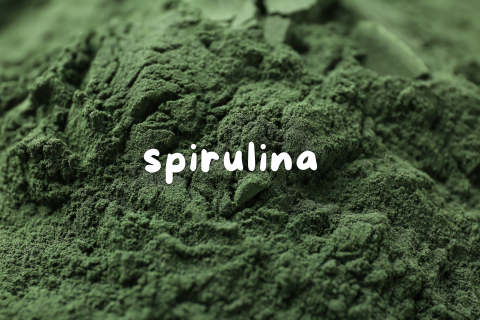The History of Spirulina
Spirulina, scientifically known as Arthrospira Platensis, has been celebrated for centuries as a nutritional powerhouse. This blue-green algae is renowned for its exceptional health benefits and has been used as a food source by various cultures throughout history.
In Sanskrit, it is often referred to as "पर्ण" (Parna), which translates to “leaf,” symbolizing its vibrant, green color and plant-like qualities.
In Chinese, it is known as "螺旋藻" (Luóxuánzǎo), meaning "spiral algae," indicative of its unique morphology and ecological characteristics.
Historically, Spirulina has been utilized by various cultures, including the Aztecs and ancient African civilizations, who recognized its high protein content and rich nutrient profile.
This blue-green algae was harvested from natural bodies of water and consumed for its energizing properties, contributing to the overall well-being of those who incorporated it into their diets.

The Characteristics of Spirulina
Spirulina is a remarkable superfood packed with nutrients, including protein, vitamins, and minerals, making it a complete source of nutrition. Spirulina is rich in antioxidants, particularly phycocyanin, which helps combat oxidative stress and supports overall immune health.
In Ayurveda, Spirulina is often regarded as a powerful Rasayana, a rejuvenating herb that enhances vitality and promotes longevity.
Its nutrient-dense profile not only aids in detoxification but also boosts energy levels and supports metabolic function.
Having been consumed for centuries, Spirulina offers holistic healing and revitalizing properties, enriching your health from the inside out.

What Benefits does Spirulina provide?
Regular consumption of Spirulina can enhance energy levels and boost vitality, supporting an active lifestyle and improving physical performance.
Rich in antioxidants, Spirulina helps combat oxidative stress, protecting cells from damage and supporting immune health.
Incorporating Spirulina into your daily routine can be an effective way to elevate your health and well-being, providing essential nutrients that support a vibrant and active lifestyle.
Benefits
- Nutrient-Dense Superfood: Spirulina is rich in vitamins (such as B vitamins), minerals (including iron, magnesium, and calcium), and essential fatty acids. It contains high-quality protein, making it an excellent addition to plant-based diets.
- Boosts Energy Levels: Due to its high protein content and essential nutrients, Spirulina can enhance energy levels and stamina, making it popular among athletes and active individuals.
- Supports Immune Health: Spirulina is packed with antioxidants and anti-inflammatory compounds that help strengthen the immune system, providing the body with defenses against infections and diseases.
- Improves Digestive Health: Spirulina promotes a healthy gut microbiome, aiding digestion and nutrient absorption. Its fiber content also supports regular bowel movements.
- Reduces Inflammation: The anti-inflammatory properties of Spirulina can help alleviate discomfort associated with inflammatory conditions and promote overall joint health.
- Supports Heart Health: Spirulina may help lower cholesterol levels and blood pressure, contributing to improved cardiovascular health.
- Enhances Skin Health: The antioxidants in Spirulina can help protect the skin from oxidative damage, promoting a youthful appearance and overall skin health.
- Regulates Blood Sugar Levels: Some studies suggest that Spirulina may help regulate blood sugar levels, making it beneficial for those managing diabetes.
- Detoxification Support: Spirulina has the potential to bind to heavy metals and toxins in the body, aiding in their elimination and supporting overall detoxification.

Spirulina and Ayurveda
In Ayurvedic terms, Spirulina has a sweet rasa (taste) and a cooling virya (energetic effect) on the body. The sweet taste reflects its ability to nourish and sustain energy levels, while its cooling effect can help balance heat in the body, making it suitable for various body types.
Spirulina is known to be beneficial for all three doshas—Vata, Pitta, and Kapha. It helps to nourish and stabilize the Vata dosha, which governs movement and communication.
For Pitta, it provides cooling properties that can help alleviate heat-related imbalances. Additionally, it supports the Kapha dosha by providing nourishment without excessive heaviness, making it a well-rounded supplement for overall balance.
Spirulina is considered to enhance sattva, the quality associated with clarity, purity, and intelligence.
Consuming Spirulina can promote mental clarity and emotional balance, aligning with the Ayurvedic goal of cultivating a harmonious and elevated state of being.
Furthermore, Spirulina is believed to support and nourish ojas and prana. Ojas represents the essence of vitality and immune strength, while prana embodies the life force that fuels our physical and mental processes.

Who is Spirulina Good for?

Spirulina is a nutrient-dense superfood that can benefit a wide range of individuals, making it suitable for various lifestyles and health goals. Here are some specific groups that may find Spirulina particularly beneficial:
- Athletes: Spirulina supports muscle recovery, boost energy levels, and improve overall performance due to its amino acids and anti-inflammatory properties.
- Immune Support: With its antioxidant and anti-inflammatory properties, Spirulina can be helpful for individuals looking to strengthen their immune system and protect against illness.
- Energy Boost: The adaptogenic properties of Spirulina may aid those dealing with stress or fatigue by providing essential nutrients that support energy levels and overall well-being.
- Weight Loss: Spirulina can assist in weight management by providing a low-calorie source of nutrition that helps curb cravings.
- Muscle Strength: Spirulina is beneficial for enhancing muscle strength, endurance, and overall performance in exercise and fitness routines.
How to Take Spirulina

Spirulina can be easily incorporated into your daily routine in various forms, allowing you to enjoy its numerous health benefits seamlessly.
- Supplements: One of the simplest ways to include Spirulina in your routine is through daily capsules. These provide a concentrated dose of its nutrient-rich profile, supporting energy levels and overall vitality.
- Powder: Spirulina powder can be stirred into smoothies, juices, or water for a nutritious boost. It can also be added to your favorite recipes, like energy bars or baked goods, for added health benefits.
- Fresh or Dried: If you have access to fresh spirulina, you can add it to salads or soups for a nutritious enhancement. Dried spirulina can also be sprinkled on dishes to elevate their nutritional content.
- Smoothies: Blending spirulina into your morning smoothie is a great way to start the day with a powerful dose of nutrients, enhancing both flavor and health benefits.
Contraindications
If you are pregnant, nursing, or planning to become pregnant, it's best to seek advice from your healthcare professional before incorporating spirulina into your diet.







